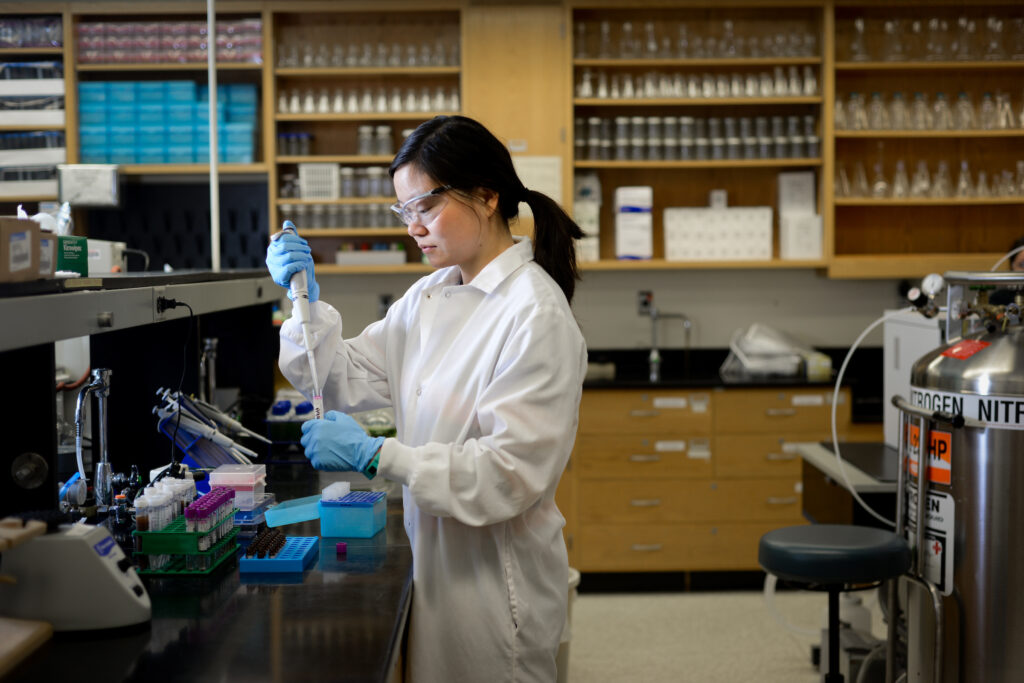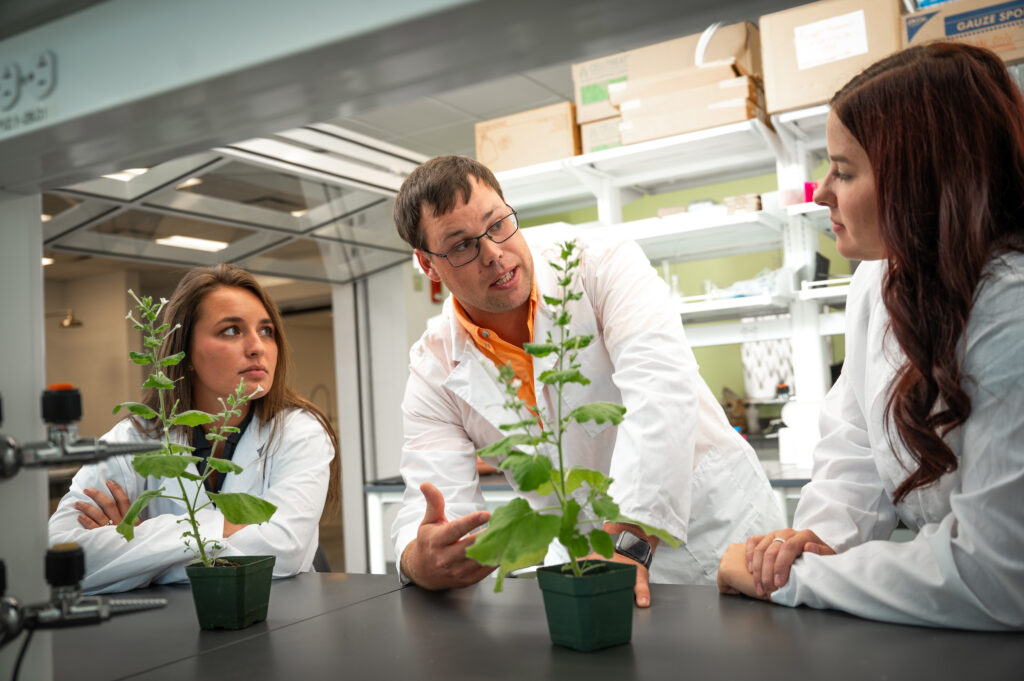Sustainable Labs
Driving sustainability forward through research and application.
Sustainability is a core value at NC State, integral to both research and stewardship. The Sustainable Labs program exemplifies these values by demonstrating the university’s commitment to wise resource stewardship, prudent financial planning and environmentally responsible operations within campus laboratories.
Sustainable Labs at NC State aims to enhance sustainability in the lab environment, focusing specifically on four major pillars: energy efficiency, waste reduction, water conservation and safety enhancement. For more in-depth details about the program, please review our Sustainable Labs Guidelines document.
Four Pillars of Sustainable Labs
Energy
Addressing global challenges in laboratory facilities often requires a significant amount of energy use. The U.S. Department of Energy notes that laboratories can account for up to 70% of a campus’s energy consumption. By incorporating energy conservation best practices within campus labs, NC State can reduce its environmental impact and electricity demands. These strategies include:
- Integration of energy-efficient LED lighting
- Turning off lighting when not in use
- Shutting the fume hood sash
- Unplugging dormant equipment
- Sharing freezer space
Learn more about NC State’s energy initiatives by exploring Energy Management’s ULT Freezer Rebate Program and the Fume Hoods and Lab Exhaust Program.
Waste
NC State labs generate both hazardous and non-hazardous waste. A Sustainable Lab partners with both Environmental Health and Safety and Waste Reduction and Recycling to best assess its specific waste management strategies. Sustainable labs also explore lab product suppliers that design out waste in their processes and offer take-back programs for recycling and reuse. Other strategies include:
- Inventorying lab supplies
- Sharing equipment among different lab spaces
- Considering the following factors for sustainable lab purchasing:
- Is it durable and made to last a long time?
- Can it be reused, recycled and/or returned to the manufacturer?
- Is it available in bulk, shipped locally using less packaging?
- Is it made with recycled content and/or a reduced amount of natural resources?
- Is it energy and water-efficient?
Water
Some labs require significant amounts of water to fulfill their operational and cooling requirements. For instance, a single lab sink faucet can consume nearly 4 gallons per minute. Given the challenging nature of identifying and minimizing water usage in busy labs, a combined approach that involves both infrastructure modifications and behavioral practices is key. These approaches include:
- Running autoclaves and dishwashers at full capacity
- Reducing the usage of deionized (DI) water
- Phasing out single-pass cooling systems
- Installing low-flow aerators on faucets
- Reporting leaks and/or equipment malfunctions immediately
Safety
NC State is committed to both safety and environmental stewardship. By adopting management practices that increase our material awareness, decrease our reliance on hazardous chemicals and foster more collaborative atmospheres, workplace safety can be significantly bolstered. Other measures include:
- Embracing the U.S. Environmental Protection Agency’s 12 principles of green chemistry
- Regularly updating lab management plans
- Ensuring compliance with routine lab inspections
- Substituting hazardous chemicals with safer alternatives
- Enhancing awareness of the contents within the laboratory space
Our Approach
The four pillars of Sustainable Labs can be classified into two complementary approaches to the Sustainable Labs program: Facilities and People.
Facilities
This approach concentrates on facility and infrastructure-based enhancements in lab design, such as:

- Installation of Variable Air Volume (VAV) fume hoods
- Integration of energy-efficient LED lighting
- Phasing out single-pass cooling systems
- Implementation of other mechanical improvements
These initiatives collectively establish a baseline for minimizing the environmental footprint of laboratory operations.
People
Sustainable Labs adopts a behavioral approach by empowering individuals to voluntarily adopt environmentally-friendly practices to “green” their labs, such as:

- Turning off lighting when not in use
- Shutting the fume hood sash
- Recycling laboratory materials correctly
- Using less hazardous chemicals
- Running dishwashers at full capacity
By choosing to implement just a few of these best practices, substantial economic and environmental savings can be achieved.
Certify Your Campus Lab Sustainable
Every campus lab can be a sustainable lab. To ensure your lab advances campus sustainability goals, review the following information:
- Take the REPORTER Course, Sustainable Labs Course
- Review the Sustainable Labs Guidelines
- Use this form to request a sustainable lab kit for your lab! Labs are not required to become a certified Sustainable Lab in order to receive a kit. However, the available materials can help labs to achieve items on the checklist. Items available for the kit include educational stickers, a faucet aerator, outlet timers, and materials to conduct a freezer defrost.
- Review and complete the Sustainable Labs Checklist
For questions and more information on the certification process, contact: sustainablelabs@ncsu.edu.
Certified Sustainable Labs
Sustainable Labs College/Department Certification Date The Laboratory of Soft Materials and Green Chemistry College of Natural Resources Spring 2024, Spring 2025 Cognitive Behavioral Lab College of Agriculture and Life Sciences Fall 2024 Food Sustainability Group College of Agriculture and Life Sciences Fall 2024 Hodges Wood Products Lab – Laminate Testing Lab College of Natural Resources Fall 2024 Sustainable Manufacturing Laboratory College of Natural Resources Fall 2024 Kleiner Lab College of Agriculture and Life Sciences Spring 2025 Cowger Lab College of Agriculture and Life Sciences Spring 2025 ETM Prep Room College of Natural Resources Spring 2025 Breen Lab College of Veterinary Medicine Spring 2025
Archived Certified Sustainable Labs
Sustainable Labs College/Department Certification Date Biotechnology Program Teaching Lab Biotechnology Program Spring 2024 Whitehill Lab – Christmas Tree Genetics College of Natural Resources Spring 2024 Buchler Lab College of Veterinary Medicine Spring 2024
Additional Resources
- Smart Labs Toolkit
- U.S. General Services Administration’s Sustainable Facilities Tool
- My Green Lab
- International Institute for Sustainable Labs (I2SL)
- Take the pledge!
Labs at NC State account for:
27%
45%
52%
Interested in hosting a Sustainable Lab?
Fill out this interest form or contact: sustainablelabs@ncsu.edu